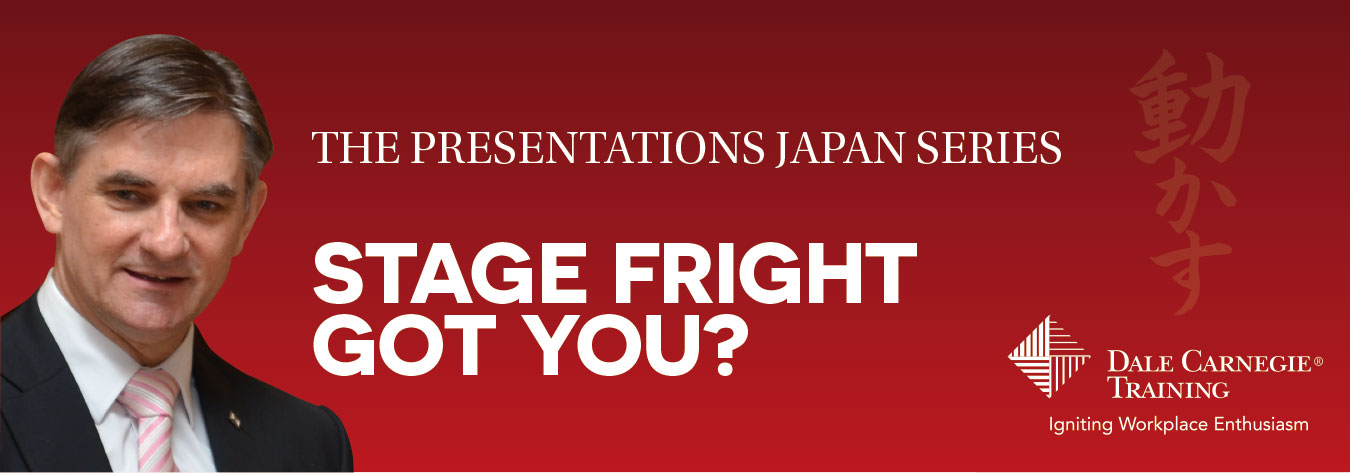Hands and legs quivering, knees knocking together, face turning red, pulse racing, mind whiting out—this is stage fright. The term is associated with the total meltdown people experience when they get up to speak on stage in front of an audience. In Japan, there is even an association for those wishing to overcome stage fright. Our exposure to the “stage”, broadly defined, is any occasion when we are required to get up and speak in front of others. The need to do so increases as we get older.
Our work responsibilities are rewarded with a salary, but also the obligation to give reports or speeches. We are innocently beavering away at our jobs, are recognised for doing well, and are given promotions or more responsibility. This is when we are forced to move out of our area of defined expertise and out of our comfort zone.
Tetsuya Miyaki is a typical example. He was a low-level bureaucrat in a municipal government office, but after being promoted to become the head of a department, he suddenly found himself having to give public presentations, including to the municipal assembly. His ambitions had now outstripped his abilities.
When he became the mayor of a city ward, the speech requirement exploded, and so did his stress. The opportunity to enjoy the fruits of hard-earned prominence were removed, because this one part of the job was killing him. “I feel as though I barely made it through my term”, he lamented.
Eye off the ball
This is what happens to us. With no thought for the future, we plough along working hard, looking for the rewards, but forgetting the escalation of expectations that go together with that. If we took our nose off the grindstone and looked ahead, we would realise that, if we go further up in the echelon of organisations, our ability to speak in a professional manner will come with the territory.
I was the same. When I was younger, a friend of mine asked me to be best man at his wedding. I demurred and suggested an older mutual friend instead, citing my lack of experience for such a daunting responsibility.
The real reason was my terror of having to speak at the wedding, instead of just sitting there cool, calm and collected, eating, drinking and enjoying myself like everyone else. Did I look ahead and realise this is what comes with future responsibilities and go and get some public speaking training? No. I just avoided the issue at every turn, running away from every request like a scared rabbit.
Eventually, I gave my first public speech. It was in Tokyo in late 1983, in Japanese and it was horrible. I was supposed to talk for 30 minutes, but I finished in about eight. My nerves were ramping up my speaking speed. I read the whole thing, never looked up at my victims, didn’t smile, had no pauses, no gestures, no animation and, to top it off, high blood pressure was giving me a big red face like a warning beacon.
I was stubborn. Did I go and get training after this near-death experience? No, I just kept on doing it the hard way. Ultimately, I gave hundreds of speeches in the course of my work responsibilities. I improved as I got more experience through simple repetition of the act, but I was still just an amateur bumbling along.
Revelation
When I took the High Impact Presentation Course with Dale Carnegie it was such a revelation. Two instructors, everything videoed, massive personal coaching—it was amazing. I kicked myself for the price I paid by not having done this when I was younger.
I was an idiot. I could have spent decades polishing this speaking skill, rather than hiding from it. I could have ramped up my personal brand big time, if I had been even half smart, and got the training. Like Miyaki, for long periods of my career I was in pure self-denial.
on’t be stupid like me—get the training. If you are going to get anywhere in your career, you will need this facility to not just speak competently in front of an audience, but to speak persuasively. It is not a matter of if, only a matter of when. Are you going to let stage fright get you?
You’re the boss
It is quite interesting that our clients come from just about every industry you can imagine, but we have noticed some common requests for improving team performance.
The four most popular areas are leadership, communications, sales and presentations. Although we started in New York in 1912, in Japan we deliver 90% of our training in Japanese. Also, having launched in Tokyo 53 years ago, we have been able to master how to bring global best practices, together with the required degree of localisation.
Engaged employees are self-motivated. The self-motivated are inspired. Inspired staff grow your business, but are you inspiring them? We teach leaders and organisations how to inspire their people. Want to know how we do that? Contact me at greg.story@dalecarnegie.com.







